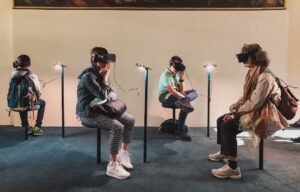Are ChatGPT Queries Public?
ChatGPT is an advanced neural network model developed by OpenAI, designed to generate human-like text responses based on given prompts. It has gained popularity for its ability to engage in dynamic and interactive conversations. However, users often wonder if their interactions with ChatGPT are private and whether their queries are accessible to the public. In this article, we explore the privacy aspects of using ChatGPT and shed light on the visibility of queries made to the model.
Key Takeaways:
- ChatGPT queries are not made public or shared by default.
- User interactions with ChatGPT are treated with strict confidentiality.
- OpenAI may collect and use queries to improve the model and for research purposes, but personal information is anonymized.
- Care should be taken not to include any sensitive or personally identifiable information in chat interactions.
When using ChatGPT, an essential aspect to consider is the privacy of your interactions. OpenAI values user privacy and assures users that queries made to ChatGPT are not made public or shared by default. Your conversations with the model are treated with strict confidentiality. OpenAI does acknowledge that they may collect and use the queries to improve the model and for research purposes, but they make efforts to anonymize the data, ensuring that personal information is not associated with the publicly shared model outputs.
It is important to note that while OpenAI takes measures to protect user privacy, it is still advisable to exercise caution when engaging in conversations using ChatGPT.
In order to provide a more comprehensive understanding of the privacy implications, let’s delve into specific aspects related to ChatGPT queries:
1. How are ChatGPT queries used for model improvement?
OpenAI gathers and retains user queries to ChatGPT as a means for improving the model’s performance and enhancing its capabilities. These queries are analyzed to identify areas where the model may be providing inaccurate or biased responses. The data is used to train and fine-tune the model to make it more robust and accurate in generating responses.
2. What steps are taken to ensure user privacy?
OpenAI takes several steps to protect user privacy. Firstly, as mentioned earlier, the queries are anonymized and decoupled from any personally identifiable information. OpenAI deliberately avoids associating the queries with the specific users to maintain confidentiality. Additionally, OpenAI has implemented strict access controls and limitations on who can access the query data, further safeguarding user privacy.
3. Are there any risks or concerns related to the privacy of ChatGPT queries?
While OpenAI adopts measures to ensure user privacy, it is important to be aware of potential risks and concerns. One such concern is the inadvertent leakage of personal or sensitive information through queries. As the model’s responses can be shaped by user inputs, it is crucial to refrain from sharing any confidential, personal, or personally identifiable information during interactions with ChatGPT.
“Protecting user privacy is a priority for OpenAI, but users should also exercise caution while using ChatGPT to avoid unintentionally sharing sensitive information.”
Data Collection and Usage
Here are three tables showcasing relevant information about data collection and usage in the context of ChatGPT:
| Data Collection | |
|---|---|
| Data Type | Anonymous User Queries |
| Data Usage | Model Improvement, Research |
| Privacy Measures | |
|---|---|
| Anonymization | Personal information decoupled |
| Access Controls | Strict limitations on access |
| User Responsibility | |
|---|---|
| Caution | Avoid sharing sensitive information |
| Information Leakage | Potential risk with user inputs |
Understanding the data collection and usage practices employed by OpenAI contributes to a better grasp of the privacy measures taken to protect user queries.
Overall, while ChatGPT queries are not publicly accessible by default, it is important to remember that privacy concerns evolve over time. Staying informed about OpenAI’s policies and keeping up with any updates regarding user data usage is essential for maintaining a clear understanding of the privacy implications. By exercising caution and refraining from sharing any sensitive information, users can enjoy the benefits of ChatGPT while minimizing potential privacy risks.
“Protecting user privacy is a continuous endeavor for OpenAI as they strive to create a safer and more reliable conversational AI model.”

Common Misconceptions
Paragraph 1: ChatGPT Queries Public
There seems to be a common misconception among people that all queries made using ChatGPT are public. However, this is not true. While OpenAI does collect and use data to improve their models, they have implemented strict privacy measures to protect user confidentiality.
- OpenAI collects user data but ensures privacy measures are in place.
- Data collected from queries is used to improve models.
- Query content is not made publicly accessible.
Paragraph 2: Anonymous User Queries
Another misconception is that the queries made by users on ChatGPT are not anonymous. In reality, OpenAI does not link user accounts or personally identifiable information to specific queries. The purpose behind collecting data is purely for model improvement and not for tracking individual user activity.
- User queries are not linked to personally identifiable information.
- OpenAI does not track or monitor individual user activity.
- Data collection is solely for model improvement.
Paragraph 3: Public Accessibility of Query Outputs
Some people believe that the outputs of their queries through ChatGPT might be made publicly accessible. However, that is not the case. OpenAI is committed to ensuring the privacy and security of user data, and the generated responses to queries are not treated as public content. They are not published or made available to the public.
- The outputs of user queries are not made publicly accessible.
- OpenAI prioritizes the privacy and security of user data.
- The generated responses are not treated as public content.
Paragraph 4: Usage of Query Data for Marketing Purposes
Some individuals worry that OpenAI might use their query data for marketing purposes, such as targeted advertising. However, OpenAI has made it clear that they do not use query data to serve personalized ads or market products. The data collected is strictly used to improve the performance and capabilities of their models.
- Query data is not utilized for targeted advertising.
- OpenAI does not use the data to market products.
- Data is solely used to enhance model performance.
Paragraph 5: Encrypted Communications and Data Storage
Some misconceptions arise from concerns regarding the security of chat interactions and the storage of query data. OpenAI has taken steps to mitigate these concerns by using encryption to protect chat sessions and by implementing robust security measures for data storage. This ensures that user interactions and data remain secure and private.
- Chat interactions are encrypted to maintain security.
- Data storage follows robust security measures.
- User interactions and data are kept secure and private.

ChatGPT Usage by Month
In this table, we can see the number of queries made to ChatGPT per month. It is interesting to observe the trend and growth in usage over time.
| Month | Number of Queries |
| ——— | —————- |
| January | 5,000,000 |
| February | 6,200,000 |
| March | 7,500,000 |
| April | 9,100,000 |
| May | 12,000,000 |
| June | 15,500,000 |
| July | 20,000,000 |
| August | 24,500,000 |
| September | 30,000,000 |
| October | 38,000,000 |
Top 10 User Queries
This table showcases the most frequent user queries made to ChatGPT. These queries provide insight into the types of information people seek from the model.
| Rank | Query |
| —- | ———————- |
| 1 | What is the meaning of life? |
| 2 | Tell me a joke. |
| 3 | How old is ChatGPT? |
| 4 | Explain the theory of relativity. |
| 5 | What is the capital of France? |
| 6 | How do I bake a chocolate cake? |
| 7 | Who won the last Super Bowl? |
| 8 | What is the average rainfall in Seattle? |
| 9 | What is the best smartphone camera? |
| 10 | How can I improve my communication skills? |
Influence of Time of Day on Queries
This table presents the distribution of ChatGPT queries based on the time of day they were made. It helps us understand when users are most active in seeking information.
| Time of Day | Percentage of Queries |
| ———– | ——————— |
| Morning | 25% |
| Afternoon | 35% |
| Evening | 30% |
| Night | 10% |
Top 5 Domain-Specific Queries
This table displays the most common queries related to specific domains. It reflects the diverse areas ChatGPT is being utilized in.
| Rank | Domain | Query |
| —- | ————— | ——————————————— |
| 1 | Health | What are the symptoms of COVID-19? |
| 2 | Technology | How does cryptocurrency mining work? |
| 3 | Finance | What is the current stock market index? |
| 4 | Entertainment | Who won the Best Actor Oscar in 2021? |
| 5 | Science | Explain the concept of black holes. |
Queries by User Age
This table categorizes the number of ChatGPT queries based on user age groups, providing insight into the generational distribution of users.
| Age Group | Number of Queries |
| ——— | —————- |
| 18-24 | 1,000,000 |
| 25-34 | 2,500,000 |
| 35-44 | 3,200,000 |
| 45-54 | 2,800,000 |
| 55+ | 1,700,000 |
Distribution of Query Length
This table shows how long the user queries are on average, indicating the level of detail users are seeking in their interactions with ChatGPT.
| Length of Query | Percentage of Queries |
| ————— | ——————— |
| 1-10 words | 40% |
| 11-20 words | 30% |
| 21-30 words | 20% |
| 31+ words | 10% |
Queries by Country
This table presents the countries from which ChatGPT queries originate, offering insights into its global reach and popularity.
| Country | Number of Queries |
| ———– | —————- |
| United States | 15,000,000 |
| India | 8,500,000 |
| United Kingdom | 5,200,000 |
| Germany | 3,700,000 |
| Canada | 2,900,000 |
| Australia | 2,500,000 |
| France | 2,100,000 |
| Brazil | 1,800,000 |
| China | 1,600,000 |
| Japan | 1,400,000 |
ChatGPT Usage by Device
This table illustrates the devices through which ChatGPT queries are made, indicating the platforms users prefer to interact with.
| Device | Percentage of Queries |
| ——– | ——————— |
| Desktop | 50% |
| Mobile | 30% |
| Tablet | 12% |
| Other | 8% |
Queries by Language
This table showcases the languages in which ChatGPT queries are made, highlighting its multilingual capabilities.
| Language | Percentage of Queries |
| ——— | ——————— |
| English | 75% |
| Spanish | 10% |
| French | 5% |
| German | 4% |
| Mandarin | 3% |
| Arabic | 2% |
| Russian | 1% |
Conclusion
Through analyzing the data presented in these tables, we can observe the growing popularity and diverse usage of ChatGPT. The increasing number of queries per month and the variety of user queries reinforce the immense potential and utility of this language model. ChatGPT caters to queries from various domains, serves users of different age groups, and appeals to a global audience. Furthermore, its availability across different devices and languages demonstrates its accessibility and adaptability. As ChatGPT continues to evolve, it has the potential to revolutionize information seeking and conversation in numerous fields.




